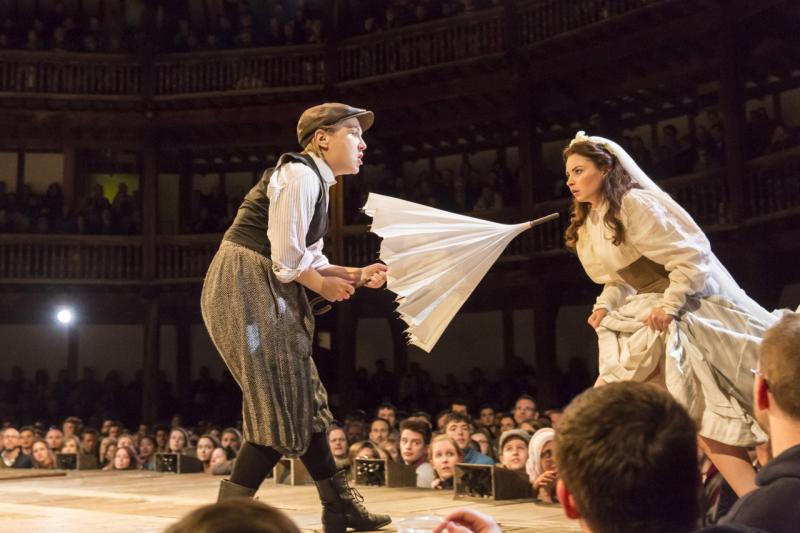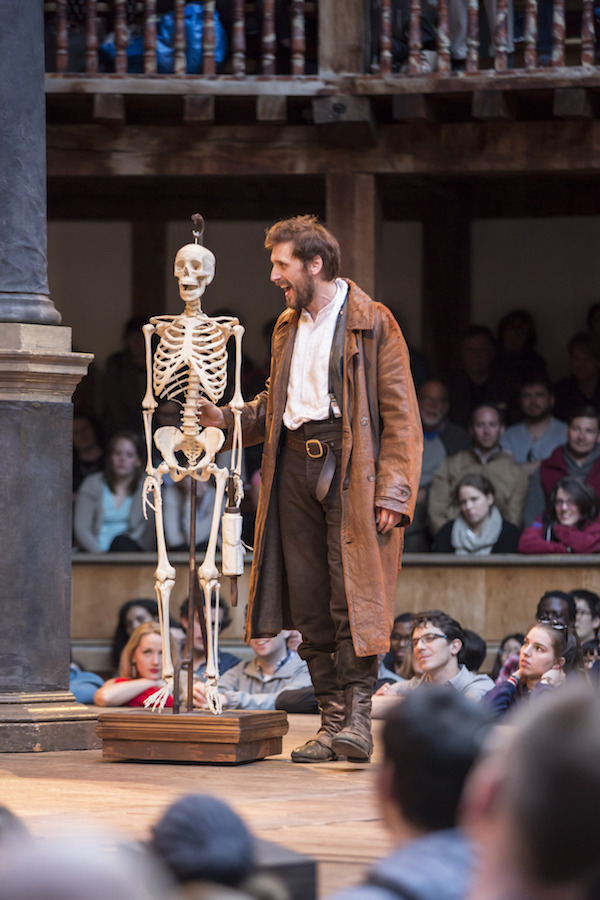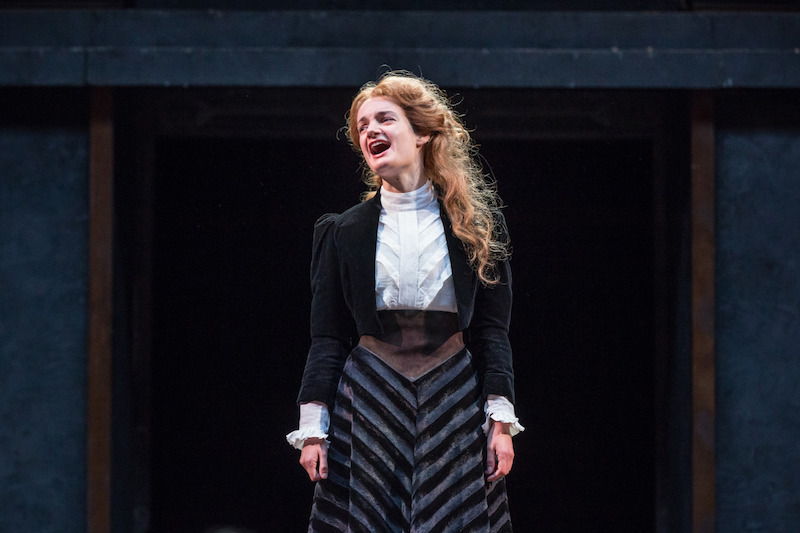The Taming of the Shrew, Shakespeare's Globe | reviews, news & interviews
The Taming of the Shrew, Shakespeare's Globe
The Taming of the Shrew, Shakespeare's Globe
Tragedy and comedy combine in this startling, all-Irish take on Shakespeare's trickiest play

There’s a problem with The Taming of the Shrew, and it isn’t the one of Shakespeare’s making. So legendary are the work’s difficulties, so notorious its potential misogyny, that each new production can feel like a proffered solution, a defence of an attack that has yet to be made, rather than a free dialogue with a set of characters and a story.
The joy of Caroline Byrne’s new production for the Globe is precisely its ease. She doesn’t so much wrestle with the text as surrender herself to its flow, whether that carries her to dark places or light. The result is a show that’s half comedy and half tragedy – a play that should be at odds with itself, but whose honesty and energy somehow make a coherent and thought-provoking whole of it.
 When we talk about the Easter Rising it isn’t usually the start of a conversation about feminism, but that’s the discussion Byrne is keen to have with her Shrew, which falls on the hundredth anniversary not only of the rebellion but also the Irish Proclamation that granted Irish women equal rights to men. These rights and freedoms were subsequently challenged and eroded, and remain so even to this day – something Byrne, her all-Irish cast and her pre-war production bring home.
When we talk about the Easter Rising it isn’t usually the start of a conversation about feminism, but that’s the discussion Byrne is keen to have with her Shrew, which falls on the hundredth anniversary not only of the rebellion but also the Irish Proclamation that granted Irish women equal rights to men. These rights and freedoms were subsequently challenged and eroded, and remain so even to this day – something Byrne, her all-Irish cast and her pre-war production bring home.
Gone is Christopher Sly and his induction, and in its place we have a new song for Katherine. Recurring at the end of the play, and once again midway, it deliberately disrupts rather than frames the play, drawing us back to 1916 and even 2016, and the women not numbered in song or recorded history. Less sung than howled, shouted, wrenched from Aoife Duffin (a late substitute for the injured Kathy Rose O’Brien), the angry beauty of Bill Barclay’s music hangs like mist in the air of the Globe settling over the whole production. Even at its sunniest moments we cannot forget this musical cry of pain.
But sunny much of it is, whether in the knockabout physical clowning of Lucentio (Aaron Heffernan) and Tranio (Imogen Doel), Barclay's pulsing folk-score, the gorgeous Gibson Girl styling of Chiara Stephenson’s costumes or the light-touch irreverence of Byrne’s treatment of text (the wedding scene is condensed into a silent, slow-motion mime sequence, dissolving description and dialogue into vivid action). There’s pace, energy, and a real clarity to all the stage business, and if Byrne doesn’t fully take advantage of the Globe’s groundlings and this uniquely interactive set-up, then it’s because she simply doesn’t have to: the laughs are already there.
At the heart of the production’s joy and energy are Doel’s Tranio and Genevieve Hulme-Beaman’s Bianca – the former, all insouciance and swagger, a glorious bit of cross-casting, and the latter unusually assertive, a scheming minx of an ingénue, quite happy to manipulate her would-be lovers and straddle Lucentio in a hayloft.
 But it’s Duffin’s charged Katherine (pictured left) and her relationship with Edward MacLiam’s Petruchio (pictured above) that takes us to a darker place. All knicker-flashing, arse-scratching rage, the Katherine of the opening is so taut with anger that she makes even Baptista (Gary Lilburn) seem more sinned against than sinning. It’s ugly and ferocious, an animal fury that has neither a source nor, as Byrne makes abundantly clear, a viable outlet. Taken forcibly, not to say violently, in marriage by MacLiam’s uncompromising Petruchio, she has nowhere to go but inwards.
But it’s Duffin’s charged Katherine (pictured left) and her relationship with Edward MacLiam’s Petruchio (pictured above) that takes us to a darker place. All knicker-flashing, arse-scratching rage, the Katherine of the opening is so taut with anger that she makes even Baptista (Gary Lilburn) seem more sinned against than sinning. It’s ugly and ferocious, an animal fury that has neither a source nor, as Byrne makes abundantly clear, a viable outlet. Taken forcibly, not to say violently, in marriage by MacLiam’s uncompromising Petruchio, she has nowhere to go but inwards.
The natural charge and buzz of their sparring hardens into abuse, heightened by Stephenson’s bleak designs, and just as sub-plots spill over in giddy conclusion, so our hero and heroine withdraw into a tragic cycle of violence and passive endurance. It’s hard to watch, even tempered by an extended kiss (hope for the future?), and leaves us with a final speech of rare vulnerability and horror. This Katherine is truly broken. There’s no game-playing here, just submission to a system she can fight in song but not in action. Only Amy Conroy’s inscrutable Widow (pouring centuries of protest into the smoking of a single cigarette) rails silently against the tragedy – a Katherine older and perhaps wiser for her life and loss.
Byrne’s production may not offer a solution to the problem that is The Taming of the Shrew, but it’s all the better for that. There’s a price to pay for the work’s risky comedy that comes in the form of tragedy. It’s not smooth, it’s not dramatically orderly or balanced, but it is life in all its jagged, messy narrative.
- The Taming of the Shrew at Shakespeare's Globe until 6 August
- Read the latest theatre reviews on theartsdesk
rating
Explore topics
Share this article
The future of Arts Journalism
You can stop theartsdesk.com closing!
We urgently need financing to survive. Our fundraising drive has thus far raised £49,000 but we need to reach £100,000 or we will be forced to close. Please contribute here: https://gofund.me/c3f6033d
And if you can forward this information to anyone who might assist, we’d be grateful.

Subscribe to theartsdesk.com
Thank you for continuing to read our work on theartsdesk.com. For unlimited access to every article in its entirety, including our archive of more than 15,000 pieces, we're asking for £5 per month or £40 per year. We feel it's a very good deal, and hope you do too.
To take a subscription now simply click here.
And if you're looking for that extra gift for a friend or family member, why not treat them to a theartsdesk.com gift subscription?
more Theatre
 The Billionaire Inside Your Head, Hampstead Theatre review - a map of a man with OCD
Will Lord's promising debut burdens a fine cast with too much dialogue
The Billionaire Inside Your Head, Hampstead Theatre review - a map of a man with OCD
Will Lord's promising debut burdens a fine cast with too much dialogue
 50 First Dates: The Musical, The Other Palace review - romcom turned musical
Date movie about repeating dates inspires date musical
50 First Dates: The Musical, The Other Palace review - romcom turned musical
Date movie about repeating dates inspires date musical
 Bacchae, National Theatre review - cheeky, uneven version of Euripides' tragedy
Indhu Rubasingham's tenure gets off to a bold, comic start
Bacchae, National Theatre review - cheeky, uneven version of Euripides' tragedy
Indhu Rubasingham's tenure gets off to a bold, comic start
 The Harder They Come, Stratford East review - still packs a punch, half a century on
Natey Jones and Madeline Charlemagne lead a perfectly realised adaptation of the seminal movie
The Harder They Come, Stratford East review - still packs a punch, half a century on
Natey Jones and Madeline Charlemagne lead a perfectly realised adaptation of the seminal movie
 The Weir, Harold Pinter Theatre review - evasive fantasy, bleak truth and possible community
Three outstanding performances in Conor McPherson’s atmospheric five-hander
The Weir, Harold Pinter Theatre review - evasive fantasy, bleak truth and possible community
Three outstanding performances in Conor McPherson’s atmospheric five-hander
 Dracula, Lyric Hammersmith review - hit-and-miss recasting of the familiar story as feminist diatribe
Morgan Lloyd Malcolm's version puts Mina Harkness centre-stage
Dracula, Lyric Hammersmith review - hit-and-miss recasting of the familiar story as feminist diatribe
Morgan Lloyd Malcolm's version puts Mina Harkness centre-stage
 Reunion, Kiln Theatre review - a stormy night in every sense
Beautifully acted, but desperately grim drama
Reunion, Kiln Theatre review - a stormy night in every sense
Beautifully acted, but desperately grim drama
 The Code, Southwark Playhouse Elephant review - superbly cast, resonant play about the price of fame in Hollywood
Tracie Bennett is outstanding as a ribald, riotous Tallulah Bankhead
The Code, Southwark Playhouse Elephant review - superbly cast, resonant play about the price of fame in Hollywood
Tracie Bennett is outstanding as a ribald, riotous Tallulah Bankhead
 The Lady from the Sea, Bridge Theatre review - flashes of brilliance
Simon Stone refashions Ibsen in his own high-octane image
The Lady from the Sea, Bridge Theatre review - flashes of brilliance
Simon Stone refashions Ibsen in his own high-octane image
 Romans: A Novel, Almeida Theatre review - a uniquely extraordinary work
Alice Birch’s wildly epic family drama is both mind-blowing and exasperating
Romans: A Novel, Almeida Theatre review - a uniquely extraordinary work
Alice Birch’s wildly epic family drama is both mind-blowing and exasperating

Add comment